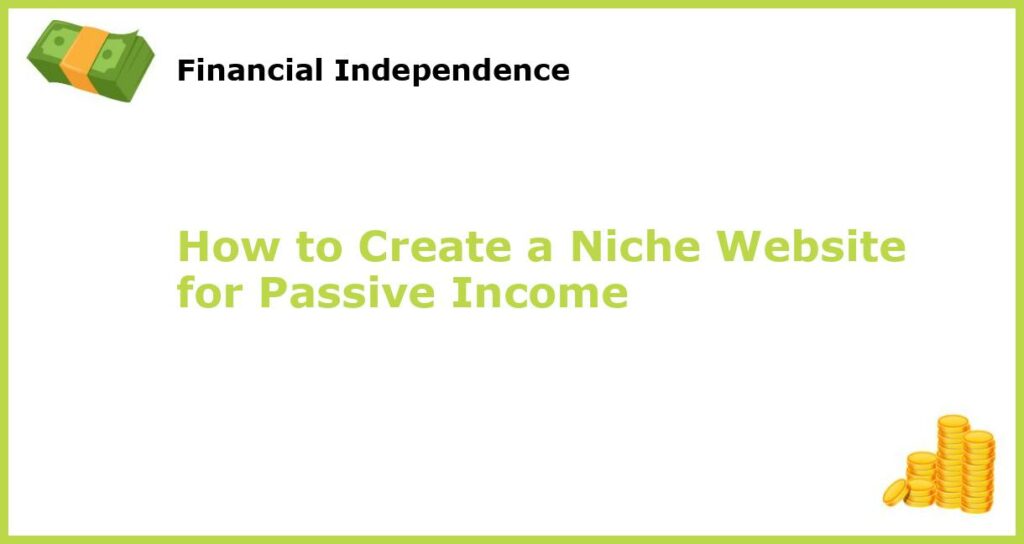Looking to make some passive income with a niche website? Smart move. With the internet becoming increasingly dominant in our day-to-day lives, there has never been a better time to start building your own online platform. With even the niche-iest topics gathering sizable followings, there’s plenty of potential to profit from the popularity of certain topics. But where do you get started? How do you create a website that is successful and sustainable? Here’s how to create a niche website for passive income.
Choose a profitable niche
Your niche is the foundation for your website. It is essential to choose a niche that is both popular and profitable. This means there needs to be demand in your chosen niche, and people must be willing to pay for your content. Health and wellness, personal finance, and technology are reliable, profitable niches. You could also choose topics that you’re interested in and brainstorm ways that they could potentially fit into a business model. Remember, sometimes the best niches may not even exist yet – so, get creative!
Research your audience
Once you’ve chosen your niche, it’s time to research your audience. You want to understand your audience’s needs, wants, pain points, and questions. By doing so, you can create valuable and relevant content that captures readers’ attention. Research can come in many forms, such as exploring online forums, conducting surveys, and reviewing social media analytics. Moreover, you could also investigate how successful websites/businesses within your niche deliver value to their audience and what strategies they use.
Build a content strategy
Content is key when it comes to building a successful niche website. You want to create a content strategy that includes blog posts, videos, podcasts, or any other types of content that would engage your audience. Be sure to invest in high-quality content creation because delivering value to your readers is what will make your website stand out from the competition. Moreover, your content should be optimized for search engines, as this will increase your chances of appearing at the top of search results.
Search engine optimization
Search engine optimization (SEO) is an essential aspect of creating a niche website. High-quality content is essential, but it’s equally important to ensure your website ranks well on Google. This means optimizing your content for specific keywords, building backlinks, creating clear and concise headlines, etc. A search engine-friendly website will allow you to rank higher and attract more organic traffic, which in turn can lead to higher earnings.
Monetize your website
If you want to make money from your website, there are many ways to monetize it. Affiliate marketing, sponsored content, selling digital products, and offering paid coaching services are popular monetization strategies. The key is to align your monetization tactics with your audience’s needs and interests to avoid turning them off. For example, if you have a blog about nutrition, perhaps consider monetizing it by selling fitness products or workout guides, which are complimentary to your audience’s interest.
Build an email list
Building an email list is crucial to establish and grow your audience. The email list can become a powerful marketing tool to help promote your content and expand your reach. You can offer a free resource or newsletter to incentivize your audience to sign up for your email list. By doing so, you ensure that you have a direct line of communication and can keep your audience informed about the latest offerings, promotions, and news regarding your niche website.
Promote your website
Promotion is crucial when you’re building a website. You can have the best website, but it’s meaningless if no one is aware of it. Some ways to promote your niche website include social media, guest posting on other websites, running ads, joining online groups and forums, and collaborating with other content creators. You must take the time and effort to find the outreach methods appropriate to your niche and audience to attract and build your clientele.
Engage with your audience
Engaging with your audience involves creating a community around your niche and continuously communicating with your readers. You must create a two-way conversation by responding to comments, emails, direct messages, or any other forms of feedback. This will help to build a strong relationship with your audience, earn their loyalty, and continue the growth of your online platform.
Track your results
Tracking your results and website’s analytic is important in understanding how your website is performing. Some essential metrics to consider keeping track of include website traffic, email list growth, social media engagement, and conversion rates. Analyzing these metrics helps you make data-driven decisions to tailor your website and content to meet your audience’s needs and preferences continually. You may even test different strategies, try various A/B testing, or implement new channels to promote your website, accordingly.
Continue to improve
Building a successful niche website requires time, patience, and, most importantly, constant improvement. That means continually testing different strategies, iterating on previous success, and getting feedback from your audience. Always consider refining and updating your content with up-to-date research, trends, and relevant topics to maintain your audience’s interest. And don’t forget to learn more about SEO and marketing – they are ever-evolving fields, and the latest strategies and techniques may already exist that could maximize your online platform’s profitability.







